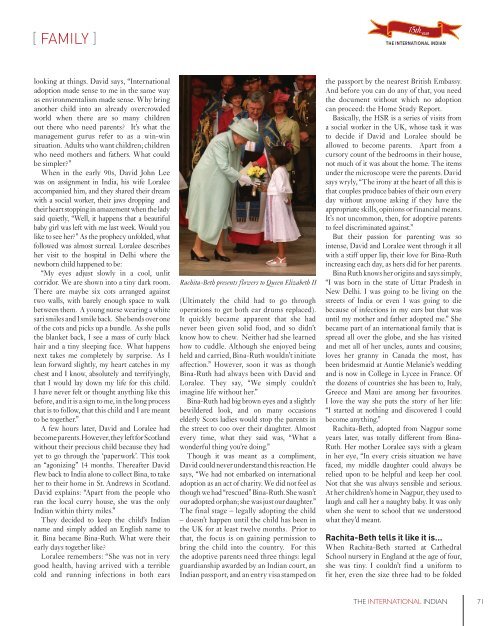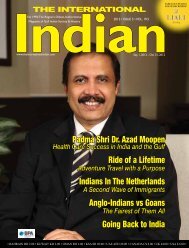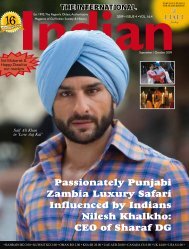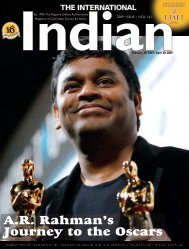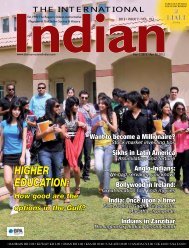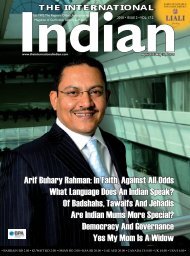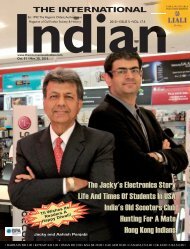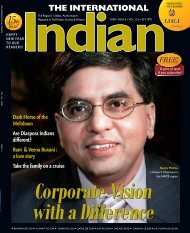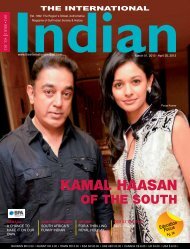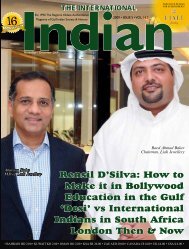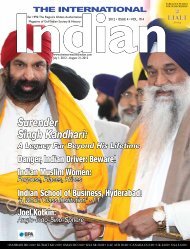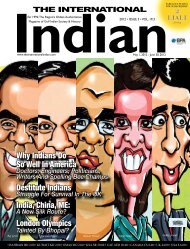THE BUSINESS OF EDUCATION - International Indian
THE BUSINESS OF EDUCATION - International Indian
THE BUSINESS OF EDUCATION - International Indian
You also want an ePaper? Increase the reach of your titles
YUMPU automatically turns print PDFs into web optimized ePapers that Google loves.
[ FAMILy ]<br />
looking at things. David says, “<strong>International</strong><br />
adoption made sense to me in the same way<br />
as environmentalism made sense. Why bring<br />
another child into an already overcrowded<br />
world when there are so many children<br />
out there who need parents? It’s what the<br />
management gurus refer to as a win-win<br />
situation. Adults who want children; children<br />
who need mothers and fathers. What could<br />
be simpler?”<br />
When in the early 90s, David John Lee<br />
was on assignment in India, his wife Loralee<br />
accompanied him, and they shared their dream<br />
with a social worker, their jaws dropping and<br />
their heart stopping in amazement when the lady<br />
said quietly, “Well, it happens that a beautiful<br />
baby girl was left with me last week. Would you<br />
like to see her?” As the prophecy unfolded, what<br />
followed was almost surreal. Loralee describes<br />
her visit to the hospital in Delhi where the<br />
newborn child happened to be:<br />
“My eyes adjust slowly in a cool, unlit<br />
corridor. We are shown into a tiny dark room.<br />
There are maybe six cots arranged against<br />
two walls, with barely enough space to walk<br />
between them. A young nurse wearing a white<br />
sari smiles and I smile back. She bends over one<br />
of the cots and picks up a bundle. As she pulls<br />
the blanket back, I see a mass of curly black<br />
hair and a tiny sleeping face. What happens<br />
next takes me completely by surprise. As I<br />
lean forward slightly, my heart catches in my<br />
chest and I know, absolutely and terrifyingly,<br />
that I would lay down my life for this child.<br />
I have never felt or thought anything like this<br />
before, and it is a sign to me, in the long process<br />
that is to follow, that this child and I are meant<br />
to be together.”<br />
A few hours later, David and Loralee had<br />
become parents. However, they left for Scotland<br />
without their precious child because they had<br />
yet to go through the ‘paperwork’. This took<br />
an “agonizing” 14 months. Thereafter David<br />
flew back to India alone to collect Bina, to take<br />
her to their home in St. Andrews in Scotland.<br />
David explains: “Apart from the people who<br />
ran the local curry house, she was the only<br />
<strong>Indian</strong> within thirty miles.”<br />
They decided to keep the child’s <strong>Indian</strong><br />
name and simply added an English name to<br />
it. Bina became Bina-Ruth. What were their<br />
early days together like?<br />
Loralee remembers: “She was not in very<br />
good health, having arrived with a terrible<br />
cold and running infections in both ears<br />
Rachita-Beth presents flowers to Queen Elizabeth II<br />
(Ultimately the child had to go through<br />
operations to get both ear drums replaced).<br />
It quickly became apparent that she had<br />
never been given solid food, and so didn’t<br />
know how to chew. Neither had she learned<br />
how to cuddle. Although she enjoyed being<br />
held and carried, Bina-Ruth wouldn’t initiate<br />
affection.” However, soon it was as though<br />
Bina-Ruth had always been with David and<br />
Loralee. They say, “We simply couldn’t<br />
imagine life without her.”<br />
Bina-Ruth had big brown eyes and a slightly<br />
bewildered look, and on many occasions<br />
elderly Scots ladies would stop the parents in<br />
the street to coo over their daughter. Almost<br />
every time, what they said was, “What a<br />
wonderful thing you’re doing.”<br />
Though it was meant as a compliment,<br />
David could never understand this reaction. He<br />
says, “We had not embarked on international<br />
adoption as an act of charity. We did not feel as<br />
though we had “rescued” Bina-Ruth. She wasn’t<br />
our adopted orphan; she was just our daughter.”<br />
The final stage – legally adopting the child<br />
– doesn’t happen until the child has been in<br />
the UK for at least twelve months. Prior to<br />
that, the focus is on gaining permission to<br />
bring the child into the country. For this<br />
the adoptive parents need three things: legal<br />
guardianship awarded by an <strong>Indian</strong> court, an<br />
<strong>Indian</strong> passport, and an entry visa stamped on<br />
the passport by the nearest British Embassy.<br />
And before you can do any of that, you need<br />
the document without which no adoption<br />
can proceed: the Home Study Report.<br />
Basically, the HSR is a series of visits from<br />
a social worker in the UK, whose task it was<br />
to decide if David and Loralee should be<br />
allowed to become parents. Apart from a<br />
cursory count of the bedrooms in their house,<br />
not much of it was about the home. The items<br />
under the microscope were the parents. David<br />
says wryly, “The irony at the heart of all this is<br />
that couples produce babies of their own every<br />
day without anyone asking if they have the<br />
appropriate skills, opinions or financial means.<br />
It’s not uncommon, then, for adoptive parents<br />
to feel discriminated against.”<br />
But their passion for parenting was so<br />
intense, David and Loralee went through it all<br />
with a stiff upper lip, their love for Bina-Ruth<br />
increasing each day, as hers did for her parents.<br />
Bina Ruth knows her origins and says simply,<br />
“I was born in the state of Uttar Pradesh in<br />
New Delhi. I was going to be living on the<br />
streets of India or even I was going to die<br />
because of infections in my ears but that was<br />
until my mother and father adopted me.” She<br />
became part of an international family that is<br />
spread all over the globe, and she has visited<br />
and met all of her uncles, aunts and cousins;<br />
loves her granny in Canada the most, has<br />
been bridesmaid at Auntie Melanie’s wedding<br />
and is now in College in Lycee in France. Of<br />
the dozens of countries she has been to, Italy,<br />
Greece and Maui are among her favourites.<br />
I love the way she puts the story of her life:<br />
“I started at nothing and discovered I could<br />
become anything.”<br />
Rachita-Beth, adopted from Nagpur some<br />
years later, was totally different from Bina-<br />
Ruth. Her mother Loralee says with a gleam<br />
in her eye, “In every crisis situation we have<br />
faced, my middle daughter could always be<br />
relied upon to be helpful and keep her cool.<br />
Not that she was always sensible and serious.<br />
At her children’s home in Nagpur, they used to<br />
laugh and call her a naughty baby. It was only<br />
when she went to school that we understood<br />
what they’d meant.<br />
Rachita-Beth tells it like it is…<br />
When Rachita-Beth started at Cathedral<br />
School nursery in England at the age of four,<br />
she was tiny. I couldn’t find a uniform to<br />
fit her, even the size three had to be folded<br />
<strong>THE</strong> INTERNATIONAL INDIAN 71


